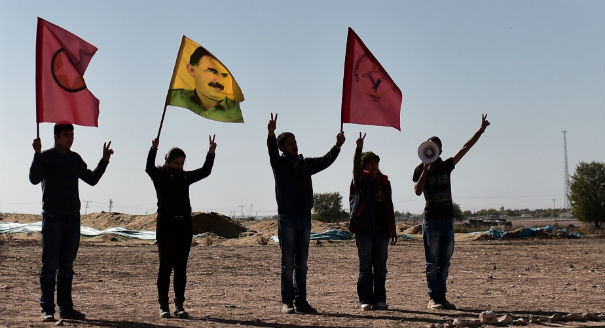When Syria’s Kurdish town of Kobani—a border town between Syria and Turkey—became a target of the Islamic State (IS), Kurds across the region reacted with a new collective consciousness. It has led to a strategic rapprochement among historically contentious Kurdish groups, especially the Kurdish Regional Government (KRG) in Iraq under the rule of Masoud Barzani, Turkey’s Kurdistan Workers’ Party (PKK), and Syria’s Democratic Union Party (PYD). Yet the different stakes that actors hold in the conflict are also straining intra-Kurdish relations even as their sense of collective identity is increasing. Stable Kurdish peace in the Middle East will therefore depend on a broader internal reconciliation among different Kurdish actors as well as an external consensus with non-Kurdish actors—both of which remain a distant possibility.
The IS siege of Kobani has strained the peace process between the Turkish government and the PKK and ignited clashes between different Kurdish groups in Turkey, including Islamist Kurds who follow the legal Free Cause Party (Huda-Par) and more secular-minded Kurds who are close to the legal Peoples’ Democratic Party (HDP)—often affiliated with the outlawed PKK. Huda-Par is mostly affiliated with the ex-Kurdish Hezbollah, an illegal armed organization, which fought against the PKK in the 1990s. In October, disadvantaged Turkish Kurds in the shantytowns of major cities such as Diyarbakir demonstrated their outrage by looting and burning down the properties of better off Turkish Kurds. These protests also highlighted the often neglected socio-economic dimensions of intra-Kurdish peace. Building internal Kurdish peace will thus demand policies that crosscut class divisions at the hands of the Kurdish political elites. Turkish Kurds not only require external peace with Turkey but they also need to establish their internal peace among contentious Kurdish groups in the region.
Furthermore, the diverging agendas of international actors exacerbate Kurdish divisions. Syrian leader Bashar al-Assad seeks his regime’s survival by relinquishing northern Syria to the PYD. Masoud Barzani of the KRG pursues the fortunes of an independent statehood and secure oil revenue through ties with Turkey. Turkey, in turn, wants Assad out and is looking forward to demilitarizing the PKK and abolishing its political practices in northern Syria. The United States, however, seeks two distinct outcomes from its alliance with the Kurds: to fight IS on the ground and to keep Iraq unified.
When Assad tacitly relinquished northern Syria to PYD control, the Turkish government pushed the party to join the anti-Assad coalition under the Free Syrian Army. But the PYD largely preferred to experiment with an autonomous democratic region as envisioned by the PKK’s founding leader Abdullah Ocalan—as opposed to a highly centralized and culturally homogenous nation-state—especially in the Syrian towns of Cezire, Afrin, and Kobani. Northern Syria has also become a site of political competition between the PKK-PYD coalition and rival Syrian Kurdish parties mostly affiliated with the KRG.
Northern Syria has thus become a site of political competition between Turkey, the PKK-PYD, and the KRG. When the area came under the control of the PYD, the Turkish government was increasingly becoming a close ally with KRG, as the latter was in need of a strong ally in its struggles with Baghdad over territory and shares of oil revenues. After the international and regional uproar over Kobani pressured the Turkish government into direct action, the government established a secure corridor for Barzani’s peshmerga to deploy some troops to Kobani through Turkey.
The United States and Turkey are also in tension over their views toward the PYD. While Turkey sees the PYD as the Syrian arm of the PKK and approaches both of them as terrorist groups, the United States differentiates PYD from the PKK, the latter of which Washington lists as a terrorist organization. However, interestingly, PYD co-president Asya Abdullah, in her interview with the Turkish Daily Milliyet, stated that the PYD is different from the PKK because the PYD is a Syrian party that struggles for a united Syria to prevent any sectarian violence. Although the PKK and PYD might share similar worldviews in terms of following Ocalan’s democratic autonomy model for Kurds, their geography of operations (i.e. Turkey and Syria, respectively) draws a boundary between the two groups. This is why the United States did not hesitate to begin direct talks with the PYD.
The siege of Kobani has clearly strained Turkey’s peace process with the PKK. It has also highlighted the shared desire for Kurdish peace in the Middle East. The challenge ahead is to ensure each actor agrees to a shared vision of what that peace will look like and what it will entail for each player. For this reason, the KRG and Turkey are likely to maintain their close relations. Although the PKK is unlikely to demilitarize itself in the midst of the IS threat, strong support for the peace process among Turkish Kurds means it will avoid all-out war with Turkey. The ruling Justice and Development Party in Turkey is especially invested in the process after publicly committing to the peace talks—treading back now carries a high political cost. Although all actors tend to agree on the necessity of the peace process, strategic interests above all will define the outcomes of both the internal peace among Kurds and Turkey’s peace talks with the PKK.
Serhun Al is a PhD candidate in the department of political science at the University of Utah.






